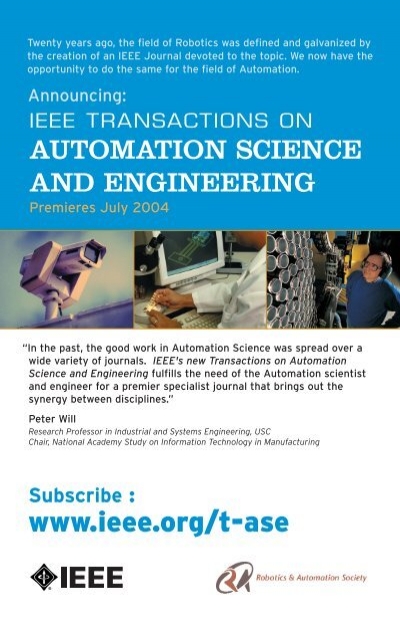基于调谐函数的多不确定性桥式起重机轻计算自适应定时控制
IF 6.4
2区 计算机科学
Q1 AUTOMATION & CONTROL SYSTEMS
IEEE Transactions on Automation Science and Engineering
Pub Date : 2025-06-06
DOI:10.1109/TASE.2025.3576775
引用次数: 0
摘要
桥式起重机是实践中重要的运输设备,现有的控制方法由于驱动不足、输入受限和计算复杂等问题,在实际应用中遇到了很多困难。本文提出了一种多不确定性欠驱动桥式起重机自适应定时控制方案,以同时应对上述挑战。通过将起重机动力学重新表述为严格反馈系统,采用坐标变化来解决欠驱动结构。设计了一系列时变调谐函数,保证输入信号在小范围内变化,以满足桥式起重机系统的实际输入要求。此外,还建立了二阶非线性跟踪微分器(NLTD),避免了虚拟控制器的重复导数计算。然后,设计了一个自适应律来处理多个不确定性,而不需要引入任何其他控制算法,只需要引入一个自适应律。在此基础上,提出了一种轻量的计算自适应固定时间控制方案,该方案由整定函数、NLTD和自适应律组成,实现了桥式起重机系统的快速定位。仿真实验验证了该方法的有效性。本工作是针对某型桥式起重机开发一种自适应定时控制方法,在海洋工程领域具有重要意义。提出了时变调谐功能,以保证起重机的均匀启动和理想的摆动范围,这在实践中是必要的。在此基础上,建立了二阶非线性跟踪微分器(NLTD),消除了虚拟控制信号的重复导数。在不需要引入任何其他控制技术的情况下,仅设计了单个自适应律来处理多个不确定性。因此,本文提出的自适应定时控制算法计算量小,更适合实际应用。所设计的方案可以实现桥式起重机系统的快速定位,在一定程度上节省了控制成本。此外,轻计算方法也适用于计算能力较弱的平台。在自制的起重机硬件测试平台上进行了初步实验。在未来,设计的控制方案将进一步应用于工业桥式起重机系统,以提高算法的效率。本文章由计算机程序翻译,如有差异,请以英文原文为准。
Tuning Function-Based Light Computational Adaptive Fixed-Time Control for Overhead Cranes With Multiple Uncertainites
Overhead cranes are important transportation equipments in practice, however, their existing control methods have encountered many difficulties in applications due to the underactuation, input limitation and computation complexity. This paper proposes an adaptive fixed-time control scheme for the underactuated overhead crane with multiple uncertainties to deal with the above challenges simultaneously. A coordinate change is employed to address the underactuated structure by reformulating the crane dynamics as a strict-feedback system. A series of time-varying tuning functions are designed to guarantee the input signal varies within a small range to meet the practical input requirement of the overhead crane system. Moreover, a second-order nonlinear tracking differentiator (NLTD) is set up to avoid the repetitive derivative calculation of the virtual controllers. Then, an adaptive law is designed to tackle multiple uncertainties with no need of introducing any other control algorithms but only the single one of itself. Further, a light computational adaptive fixed-time control scheme is proposed by consisting of the tuning functions, NLTD, and the adaption law to achieve a fast location of the overhead crane system. The simulation experiments illustrate the effectiveness of the presented method. Note to Practitioners—This work is to develop an adaptive fixed-time control method for a kind of overhead cranes, which is of important significance in the field of ocean engineering. The time-varying tuning function is proposed to guarantee an even start and a desired swing range of the crane, which is necessary in practice. Furthermore, a second-order nonlinear tracking differentiator (NLTD) is built to eliminate the repetitive derivative of the virtual control signals. Only the single adaptive law is designed to deal with multiple uncertainties with no need of introducing any other control techniques. Therefore, the presented adaptive fixed-time control algorithm has a light computation burden, which is more suitable for practical applications. The designed scheme can achieve a fast location of the overhead crane system, which saves the control cost to some extent. Moreover, the light computation method is also suitable for the platform with weak computing ability. The elementary experiments are carried out based on the self-built crane hardware test platform. In the future, the designed control scheme will be further applied to an industrial overhead crane system to enhance the efficiency of the presented algorithm.
求助全文
通过发布文献求助,成功后即可免费获取论文全文。
去求助
来源期刊

IEEE Transactions on Automation Science and Engineering
工程技术-自动化与控制系统
CiteScore
12.50
自引率
14.30%
发文量
404
审稿时长
3.0 months
期刊介绍:
The IEEE Transactions on Automation Science and Engineering (T-ASE) publishes fundamental papers on Automation, emphasizing scientific results that advance efficiency, quality, productivity, and reliability. T-ASE encourages interdisciplinary approaches from computer science, control systems, electrical engineering, mathematics, mechanical engineering, operations research, and other fields. T-ASE welcomes results relevant to industries such as agriculture, biotechnology, healthcare, home automation, maintenance, manufacturing, pharmaceuticals, retail, security, service, supply chains, and transportation. T-ASE addresses a research community willing to integrate knowledge across disciplines and industries. For this purpose, each paper includes a Note to Practitioners that summarizes how its results can be applied or how they might be extended to apply in practice.
 求助内容:
求助内容: 应助结果提醒方式:
应助结果提醒方式:


